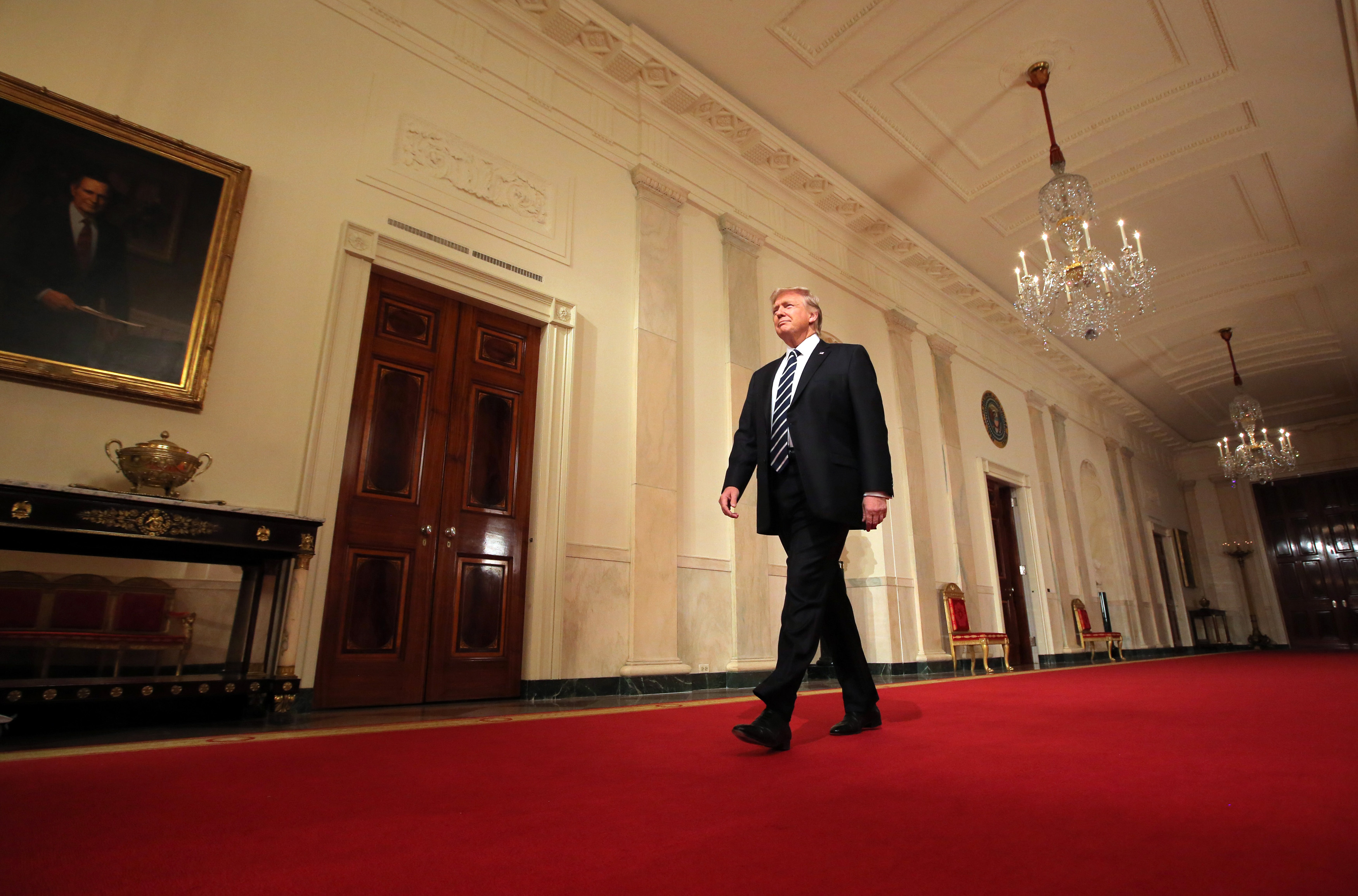Why so many conservative intellectuals became Trumpists
If now isn't the moment for decisive action to overthrow the administrative state, then when?


When you make a purchase through links on our site, we may earn a commission
Which GOP do you belong to? That's a question every Republican has been pondering since Donald Trump commandeered the party and won the White House.
There is, first, the old Grand Old Party — the party of Ronald Reagan, George W. Bush, John McCain, Mitt Romney, Paul Ryan, and an array of conservative movement activists, think tank staffers, journalists, and lobbyists. This party favors lower taxes (especially on the wealthy), less regulation, and smaller government, except when it comes to military spending, which it aims to increase to maintain America's position of global dominance and role as "leader of the free world."
The Week
Escape your echo chamber. Get the facts behind the news, plus analysis from multiple perspectives.

Sign up for The Week's Free Newsletters
From our morning news briefing to a weekly Good News Newsletter, get the best of The Week delivered directly to your inbox.
From our morning news briefing to a weekly Good News Newsletter, get the best of The Week delivered directly to your inbox.
Then there are the Trumpists — populist and nationalist Republicans (like White House senior counselor Stephen Bannon) who blend a mania for cutting taxes and government programs with an enthusiasm for trade tariffs, border walls, and immigration bans from majority-Muslim countries. This GOP also promises to increase defense spending, but not to contribute to the leadership of anything. It advocates putting "America first," by which it means that the United States should do whatever it wants anywhere it wants, including, perhaps, "taking the oil" from Iraq, backing away from our commitments to NATO, and turning a blind eye to Vladimir Putin's aggression in Eastern Europe.
Finally, there are the Republicans who bridge these two versions of the GOP. Many are long-term members of the old GOP and conservative movement who, for the sake of power, votes, and influence, have made a calculation that they need to go along, however reluctantly, with the Trumpification of the party. But others are intellectuals, political philosophers, and scholars who aren't quite Trumpists themselves, but who have genuinely come to believe the old Reaganite GOP needs to embrace and work to elevate the nascent ideology of Trumpism.
The most intellectually formidable member of this last group is arguably Michael Anton — former communications director for Rudy Giuliani (where he was my boss for the six months I served as a speechwriter for the mayor in late 2000 and early 2001), a former national security official under George W. Bush, and now a national security official for President Trump. In the months leading up to the 2016 election, Anton wrote a series of essays under the pseudonym Publius Decius Mus in which he made a breathtakingly radical case for supporting Trump's campaign. He did so not in a Bannonite idiom of right-wing tabloid populism but instead in the high-minded, morally insistent style favored by those decisively influenced by Harry Jaffa, the late conservative political philosopher who taught for many years at Claremont McKenna College and Claremont Graduate University in the eastern suburbs of Los Angeles.
Anton's ties to Jaffa are not incidental. Anton's most comprehensive and widely read pro-Trump essay — "The Flight 93 Election," which placed Hillary Clinton and the Democratic Party in the role of Islamist hijackers prepared to destroy American self-government unless Trump and his supporters successfully stormed the cockpit — was published online by The Claremont Review of Books, a quarterly journal founded and edited by Jaffa acolytes. And Anton himself, writing this time without the pseudonym, penned a lengthy and fulsome tribute to Jaffa that ran in the pages of the CRB shortly after Jaffa's death in January 2015.
A free daily email with the biggest news stories of the day – and the best features from TheWeek.com
For anyone seeking to understand the evolution of the Republican Party and conservative movement in the direction of Trumpism, Anton and the Claremont Jaffaites are crucially important. After all, a few weeks after the "Fight 93" essay appeared, several dozen intellectuals and academics signed on to a list of "Scholars and Writers for Trump." Why? Because Jaffa is the unlikely but indispensable bridge between the Republicanism of Reaganite conservatism and the Republicanism of Trumpian populism and nationalism.
Those seeking an introduction to Jaffa's thought and influence are in luck. Reagan biographer and Jaffa student Steven F. Hayward has written a new book that's a charming, fun, breezy history of Jaffa's decisive role in injecting moral and philosophical rigor into the conservative movement starting in the late 1950s with the publication of his best (and now classic) book, Crisis of the House Divided.
Jaffa promoted a distinctive mixture of resolution and flexibility — the sort you find in Abraham Lincoln, Winston Churchill, and Ronald Reagan. It also found expression in the most famous words Jaffa ever wrote — the notorious lines he contributed to Barry Goldwater's acceptance speech at the 1964 Republican convention: "Extremism in the defense of liberty is no vice" and "moderation in the pursuit of justice is no virtue." The statements presume that certain principles (the defense of liberty and pursuit of justice) are so exalted that they can transform a vice (extremism) into a virtue and a virtue (moderation) into a vice.
If that were the whole of Jaffa's contribution to conservative thinking, he'd still have exercised a strong influence on the Republican Party. But the distinctiveness of Jaffa's place in the conservative movement is also a function of the emphasis he placed in his later work on the damage done to the moral basis of the Constitution and statesmanship by the "progressive" ideology devised and implemented by Woodrow Wilson and his successors in the Democratic Party. Hayward devotes his penultimate chapter to the topic under a title that nicely captures its Jaffaite thrust: "The Administrative State and the End of Constitutional Government." By the "administrative state," Jaffa and his students mean the sprawling executive branch departments and agencies that regulate ever-increasing aspects of our lives without much of any independent oversight, accountability, or limitation.
For Jaffaites, this is an ominous development, and even one that poses an existential threat to republican government itself. Such regulations aren't just a nuisance, as many business owners claim. They aren't just a drag on the economy, as some economists insist. They don't just infringe on natural rights to property, contract, and economic exchange, as many libertarians assert. The administrative state is all those things, but it's also something more, and worse.
Jaffa and his students (including Anton) contend that Wilsonian progressivism aimed to bring about a fundamental change of the American "regime" (or form of government) instituted by the founders — and that the expanding administrative state is finally making that change a reality, regulating ever more areas of life, enforcing a uniform secular-egalitarian-globalist view on the country as a whole, actively crushing dissent, usurping popular sovereignty, and placing ever-greater portions of it in the hands of a coterie of elite experts and bureaucrats.
And that's where Trump comes in.
The crux of Anton's case for supporting Trump was that if he didn't win, it would mean the effective end of self-government in the United States. For eight years Obama expanded the administrative state more radically than any president since Lyndon Johnson, injecting intrusive regulations much further than ever before into the health-care sector, the energy sector, marriage, religion, even bathroom use in public schools. If Hillary Clinton prevailed, it would mean that those innovations would become the new baseline for even more acts of administrative overreach. After four to eight more years of that, the century-long progressive transformation of the American regime would be complete, rendering constitutional government and the conservative movement lost causes once and for all.
Desperate times call for desperate measures. Anton (as Decius) came out in favor of Trump, in part, because he hoped the real-estate mogul would serve as a blunt instrument to bring down key elements of the administrative state, including those outposts of the conservative movement (which he memorably dubbed "Conservative, Inc.") that live like parasites off of the federal government even while criticizing it and waiting for the next election that gives them an opportunity to trim it at the margins and change nothing fundamental about it at all. But Anton also hoped that Trump's full-throated defense of the nation, borders, and citizenship would catch fire among the American people, who would at long last rise up to demand that the administrative state be put back in its place — to make room once again for constitutionalism, statesmanship, and republican government of free and equal citizens.
It's quite a story — and one that very few in the Claremont circle made any effort to respond to or criticize. William Voegeli, a senior editor at the CRB, was an exception. In a thoughtful essay published shortly after "Flight 93" appeared, Voegeli denied that the stakes in 2016 were anywhere near as high as Decius insisted. A conservative could lament a Clinton victory without believing it signaled the final and permanent defeat of American self-government or the prospects for conservative rebirth in the future.
The critique was powerful, as far as it went. To go further would require a more searching examination of the Jaffaite decline narrative, according to which America's founding regime has been supplanted by a form of progressive government that is inimical to the exercise of free citizenship. As long as that assumption prevails, debates among Jaffaite conservatives will continually revert back to the question of whether or not now is the moment of the final collapse of freedom in America.
Anton made his decision last fall: The time for choosing had finally arrived. He would place his hopes for political redemption in the hands of Trump, the man for whom he now toils. Some followed Anton's example. Others made different judgment calls. But for those who follow in the footsteps of Harry Jaffa and remain true to the revolutionary potential in his thought, the need for a historical reckoning will return again and again: If now isn't the moment for decisive action to overthrow the administrative state, then when?
Damon Linker is a senior correspondent at TheWeek.com. He is also a former contributing editor at The New Republic and the author of The Theocons and The Religious Test.
-
 7 bars with comforting cocktails and great hospitality
7 bars with comforting cocktails and great hospitalitythe week recommends Winter is a fine time for going out and drinking up
-
 7 recipes that meet you wherever you are during winter
7 recipes that meet you wherever you are during winterthe week recommends Low-key January and decadent holiday eating are all accounted for
-
 Nine best TV shows of the year
Nine best TV shows of the yearThe Week Recommends From Adolescence to Amandaland
-
 Bari Weiss’ ‘60 Minutes’ scandal is about more than one report
Bari Weiss’ ‘60 Minutes’ scandal is about more than one reportIN THE SPOTLIGHT By blocking an approved segment on a controversial prison holding US deportees in El Salvador, the editor-in-chief of CBS News has become the main story
-
 Has Zohran Mamdani shown the Democrats how to win again?
Has Zohran Mamdani shown the Democrats how to win again?Today’s Big Question New York City mayoral election touted as victory for left-wing populists but moderate centrist wins elsewhere present more complex path for Democratic Party
-
 Millions turn out for anti-Trump ‘No Kings’ rallies
Millions turn out for anti-Trump ‘No Kings’ ralliesSpeed Read An estimated 7 million people participated, 2 million more than at the first ‘No Kings’ protest in June
-
 Ghislaine Maxwell: angling for a Trump pardon
Ghislaine Maxwell: angling for a Trump pardonTalking Point Convicted sex trafficker's testimony could shed new light on president's links to Jeffrey Epstein
-
 The last words and final moments of 40 presidents
The last words and final moments of 40 presidentsThe Explainer Some are eloquent quotes worthy of the holders of the highest office in the nation, and others... aren't
-
 The JFK files: the truth at last?
The JFK files: the truth at last?In The Spotlight More than 64,000 previously classified documents relating the 1963 assassination of John F. Kennedy have been released by the Trump administration
-
 'Seriously, not literally': how should the world take Donald Trump?
'Seriously, not literally': how should the world take Donald Trump?Today's big question White House rhetoric and reality look likely to become increasingly blurred
-
 Will Trump's 'madman' strategy pay off?
Will Trump's 'madman' strategy pay off?Today's Big Question Incoming US president likes to seem unpredictable but, this time round, world leaders could be wise to his playbook
